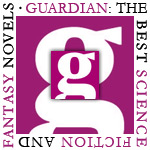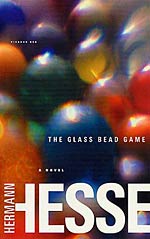Recent Additions: The Guardian List
 Back in January of 2009 The Guardian published a list of "1000 novels everyone must read," which included 149 Science Fiction and Fantasy novels. Yesterday the WWEnd team finished adding these 149 books to the database, creating our most literary-minded book list yet, Guardian: The Best Science Fiction and Fantasy Novels.
Back in January of 2009 The Guardian published a list of "1000 novels everyone must read," which included 149 Science Fiction and Fantasy novels. Yesterday the WWEnd team finished adding these 149 books to the database, creating our most literary-minded book list yet, Guardian: The Best Science Fiction and Fantasy Novels.
When I say that this list is literary-minded, I’m not exaggerating. Even though the list contains such genre fan favorites as Hitchhiker’s Guide to the Galaxy, Ringworld and Dune, the Guardian’s review panel also chose to include novels like The Master and Margarita, The Trial and Lord of the Flies, all of which are widely acknowledged masterpieces, but which are arguably not genre fiction.
 The Guardian’s list blurs the line of division between genre fiction and "literature." It may be that The Monk doesn’t have supernatural monsters or futuristic technology, but it was certainly a formational Gothic novel, inspiring what would become Science Fiction, Fantasy and Horror. Italo Calvino’s The Baron in the Trees may not be straight-up Fantasy, but its Magical Realism is a close cousin to the more popular genre. The Glass Bead Game by Hermann Hesse (better known for his Buddhist novel Siddhartha) is set in a post-WW2 Europe but maps the projected future of philosophy and education rather than technology, but it’s important to remember that philosophy is ignored at technology’s peril.
The Guardian’s list blurs the line of division between genre fiction and "literature." It may be that The Monk doesn’t have supernatural monsters or futuristic technology, but it was certainly a formational Gothic novel, inspiring what would become Science Fiction, Fantasy and Horror. Italo Calvino’s The Baron in the Trees may not be straight-up Fantasy, but its Magical Realism is a close cousin to the more popular genre. The Glass Bead Game by Hermann Hesse (better known for his Buddhist novel Siddhartha) is set in a post-WW2 Europe but maps the projected future of philosophy and education rather than technology, but it’s important to remember that philosophy is ignored at technology’s peril.
So give the new list a look. There’s something for just about everybody, and enough intriguing new possibilities to catch anyone’s interest. I never thought I’d be adding books like The Naked Lunch and The Castle of Otranto to my reading list, but I’m genuinely curious to see what they’re like.
What’s caught your eye from the Guardian list?



















 Full Details
Full Details


22 Comments
Huh, Paul Auster is an interesting inclusion; I’d call him more metafictional than science fictional.
Thank you everyone for putting this together. There are many lists out there but this is a new one with a new perspective. I like it very much and I think it is quite valuable to those of us trying to find quality books to read in the little time we have. Great work!
I am less impressed with the Guardian List than I am with Pringle’s list or The Classics of Scince Fiction List. There are a lot of books on the Guardian List that i find rather turgid.
I have gone through and marked all the ones I have read or plan to read. I also numerically rated them. Sorry about the typos in my previous post. I often am a terrible proofreader
@Mattastrophic: There are quite a few on there that challenge the standard definitions of SF/F! @Wintermute:I hope that means you’re just busy and not terminal! @Thomas Baughman: It’s not a list that everyone will like, that’s for sure! I like it because it’s a list that will drive conversations. Defining the genre is a contentious past-time. Also I want to spread out our coverage here to include more people. I think I’ll dip my toes in a little for some more challenging reading. I score rather poorly on this one but I peeked at your stats and you’ve got more than a third checked off. Not bad at all.
I like it for its "literary" value. Michel Houellebecq is one of my favorite authors and it’s great to see "Atomised" included here, albeit on the fringe of our genre. Sadly, no Murakami. I would have expected to see "Kafka on the Shore" included. Thanks for getting this together, guys!
Emil, there is a Murakami on the list: The Wind-up Bird Chronicle.
Oops @Thomas. *hides head in embarressment* – I was looking for "Kafka" and failed to notice "Wind-up". Both are excellent novels, although I would have chosen "Kafka" for the list.
Cool! Thanks Dave. Great addition. Thanks for the work.Does this mean that the WWEnd Top Nominated list has changed too?Are there more lists to come? Yes?About blurring the lines, the first two books I read after discovering WWEnd were The Yiddish Policeman’s Union and The Graveyard Book, two Hugo winners. Alternate realities? Sure. Science? Not so much. In fact, there is not even a hint of science in either book. So I am pretty much resigned to the idea that any book that wanders away from solid reality a bit can now be considered sci-fi.
@daneyvette: No problem. Glad you guys are liking the new list. The top nominated list is a manual process so I guess I’d better check it and update as necessary. Thanks for the reminder! More lists are already in the works. Putting the finishing touches on a Military SF list right now. You may have noticed all the MilSF books going in the last few months. Look for that later this week. YPU is an alternate history SF so no real need for any science in that one given the time period and Graveyard is fantasy but your point is taken. The lines are blurred across the board – which used to bother me. Now days I think it’s interesting to discuss but I don’t really care too much about where the line is drawn. I just want to find interesting reads and make you guys aware of them too!
Oh, so many books to read! 🙂 Thanks for organizing these lists on the site! I found a lot of books I’d read on this one that I had not marked as ‘read’ in my profile.I’m glad Murakami’s on the list, I think he’s a fantastic writer. I really liked both ‘Kafka by the Shore’ and ‘Wind-up Bird Chronicle’, though I guess ‘Kafka’ does seem more SF/F-like. I thought it was interesting Nathaniel Hawthorne was included. A lot of his work does lean towards supernatural, but I’ve never really thought of him as a fantasy author.
"I don’t really care too much about where the line is drawn. I just want to find interesting reads"I agree with this 100
Yeah, I think lists can be very useful but making "definitive" lists end up saying more about what the list-makers’ values than it necessarily does about what people would benefit the most from reading. As long as a list is kept elastic enough that it is never closed to modification, I’m cool with it.
As usual, I’ll start with the boast: I’ve read sixty-one of them. In general it’s a pretty obvious selection, ranging from the barely fantasy at all to the fairly hardcore. There are a few I hadn’t heard of (or in some case had heard of, but not considered) but a couple of genuine surprises, such as "Revelation Space". I like the thing, but never thought of it as being a Grauniad-type of book. The list does give me some ideas of things to buy though.
I’ve long complained that there is an attempt to classify science fiction and fantasy as hackery. Consequently, when a great piece is published, it is automatically considered to be anything but SF/F. When The Handmaid’s Tale won the Arthur C. Clarke award in 1987, Margaret Atwood famously tried to distance herself from it, denying that she wrote science fiction. When we automatically exclude books like Brave New World, Flowers for Algernon, and 1984 from the genre of science fiction, of course whatever is lest will be beneath regard.Fantasy has the added burden of perennial comparisons with the Lord of the Rings. Throughout the 60s and 70s, every fantasy book had dwarves and elves, it seemed. There was one standard world (defined by D&D, no doubt) that writers knew (or thought they knew) would sell. Fortunately those days are largely over, but we still make those associations. Why would we not regard Kafka’s monsters as fantastic? What’s more, I don’t even see it as a hard call.Having said all that, there are some "science fiction" books on this list that don’t seem to fit the category.
That was really well stated Rico. Stanislaw Lem (Solaris, Cyberiad, Futurological Congress, His Masters Voice) expressed the same sentiments that M. Atwood did. Sad. Great point about Kafka. Human beetle anyone?
[quote]I’ve long complained that there is an attempt to classify science fiction and fantasy as hackery. [/quote]"SF’s no good!" they bellow until we’re deaf."But this is good." Well then, it’s not SF.(Robert Conquest IIRC). Interestingly, Doris Lessing does not mind her SF being labelled as such, but you are correct that this is a minority view amongst literatii writing SF. But when Star Wars is upheld by fans as an example of good SF, you can hardly blame them.
Meridian: I agree. Although I will concede that Star Wars is good *something*, I don’t really classify it as science fiction, since it isn’t about science. Perhaps it is simply good space opera (by "good," I don’t mean "great"). It does seem, however, that we fans are to blame for much our exclusion in academic circles. It doesn’t help when students on college campuses start doing their doctoral presentations on Buffy the Vampire Slayer.
I’d argue that Star Wars isn’t a good example of any genre, except perhaps panto.
"Star Wars" is probably science fantasy. I stick to a very simple definition: science fiction is the literature of the possible. Everything else is [science] fantasy.
That sounds like a paraphrase of Bismarck: "Politics is the art if the possible."
Sorry, the comment form is closed at this time.